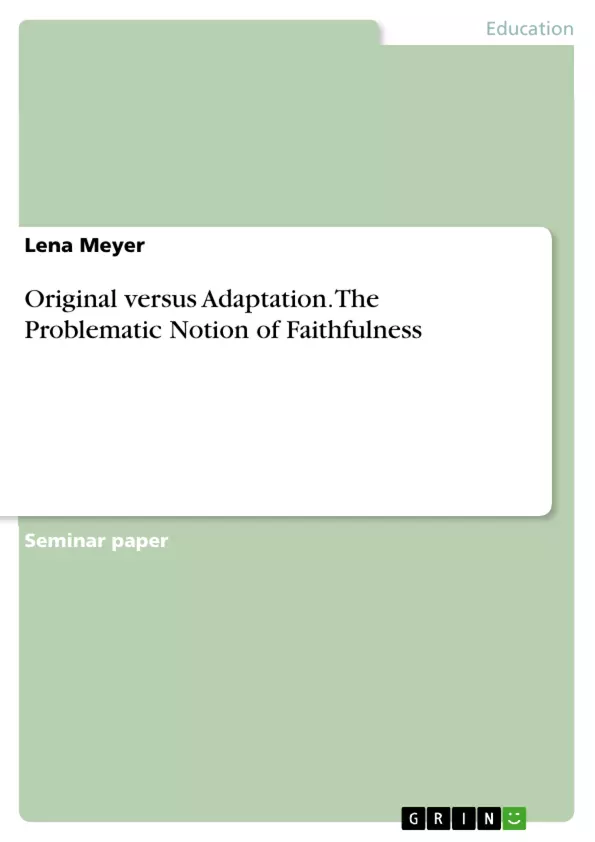The reuse of ideas already in existence – be it in parts, as a whole or as a basis for further development – seems to be a creative practice as old as art itself and is most commonly referred to as ‘adaptation’.
Yet, the exact properties denoted by this term often remain unclear, resulting in either an almost extreme narrowing or broadening of its qualities and leading to an ongoing discussion of its social and cultural value, authority and purpose.
However, since the emergence of cinema, one facet of adaptation theory appears to dominate the topic’s recent discussion in both popular and academic writing, namely movie adaptations based on literary originals, offering rather striking examples for the practice’s challenges and problems, but also illustrating the numerous possibilities it provides.
This paper primarily deals with a special aspect of these discussions: the faithfulness of movie adaptations. Seemingly, the degree of loyalty which cinematic adaptations display towards their literary originals functions as the bone of contention in many, presumably even most of the often heated debates centered around this part of a generally broad discourse – as, interestingly, non-scholarly audiences and academic writers alike tend to judge an adaptation’s quality on the basis of its, however generated, faithfulness to an original.
Inhaltsverzeichnis (Table of Contents)
- Introduction
- Adaptation: Challenges and Possibilities
- Adaptation as Ever-Changing Delineation
- Transferring Content
- Faithfulness: Criteria and Problems
- Faithfulness as Authoritative Restriction
- Novelizing Movies
- Conclusion
Zielsetzung und Themenschwerpunkte (Objectives and Key Themes)
This paper examines the faithfulness of movie adaptations to their literary originals, a central debate in adaptation theory. It explores the concept of adaptation itself, its historical context, and the challenges of transferring content between mediums. The paper also analyzes how notions of faithfulness shape the creation and perception of adaptations.
- The definition and multifaceted nature of "adaptation."
- The challenges of transferring content from literature to film.
- The concept of faithfulness in movie adaptations and its limitations.
- The cultural and social implications of adaptations.
- The contrasting perspectives on adaptations as critical reinterpretations versus mere copies.
Zusammenfassung der Kapitel (Chapter Summaries)
Introduction: This introduction establishes the central theme of the paper: the faithfulness of movie adaptations to their literary sources. It highlights the ongoing debate surrounding adaptation, its historical context, and the particular focus on film adaptations of literary works. The introduction lays the groundwork for examining the complexities of adaptation, including the challenges of content transfer and the problematic nature of defining and measuring "faithfulness."
Adaptation: Challenges and Possibilities: This chapter delves into the broad concept of adaptation, highlighting its prevalence throughout history across various art forms. It emphasizes the interconnectedness of works through intertextuality, showcasing examples where the line between original and adaptation blurs. The chapter also examines the diverse forms and possibilities of adaptation, from simple imitation to critical reinterpretations, and explores how adaptations can offer new perspectives and engage with social and cultural contexts. The discussion includes examples illustrating how adaptations can modify, critique, or even subvert their original sources, reflecting societal shifts and offering different interpretations of the original material.
Faithfulness: Criteria and Problems: This chapter focuses on the central theme of "faithfulness" in movie adaptations. It questions the suitability of this criterion for evaluating adaptations, arguing that such a focus can be limiting and neglect the broader artistic and cultural contexts of adaptation. The chapter likely explores different perspectives on faithfulness, considering the potential for adaptations to be more than mere copies and to offer unique artistic interpretations that add new value to the original work. The concept of novelization of movies might also be explored, offering an interesting counterpart to the film-to-literature adaptation.
Schlüsselwörter (Keywords)
Adaptation theory, film adaptation, literary adaptation, faithfulness, intertextuality, content transfer, originality, critical adaptation, cultural context, movie novelization.
Frequently Asked Questions: A Comprehensive Language Preview
What is the main topic of this academic paper?
The paper examines the faithfulness of movie adaptations to their literary originals, a central debate within adaptation theory. It explores the concept of adaptation itself, its challenges, and the influence of "faithfulness" on the creation and reception of adaptations.
What are the key themes explored in the paper?
Key themes include the definition and multifaceted nature of "adaptation," the challenges of transferring content from literature to film, the concept and limitations of faithfulness in movie adaptations, the cultural and social implications of adaptations, and contrasting perspectives on adaptations as critical reinterpretations versus mere copies.
What are the chapter summaries?
The Introduction establishes the central theme of faithfulness in movie adaptations. The chapter on Adaptation: Challenges and Possibilities delves into the broad concept of adaptation, its historical prevalence, and the diverse possibilities of adaptation, from imitation to critical reinterpretations. The chapter on Faithfulness: Criteria and Problems focuses on the limitations of using "faithfulness" as a sole criterion for evaluating adaptations, exploring alternative perspectives and the concept of movie novelizations.
What are the objectives of the paper?
The paper aims to analyze the complexities of adapting literary works into movies, focusing on the concept of faithfulness and its limitations. It explores the challenges of content transfer between mediums and examines the cultural and social impact of adaptations.
What keywords are associated with this paper?
Key words include Adaptation theory, film adaptation, literary adaptation, faithfulness, intertextuality, content transfer, originality, critical adaptation, cultural context, and movie novelization.
What is included in this preview?
This preview offers a comprehensive overview, including the title, table of contents, objectives and key themes, chapter summaries, and keywords.
What is the Table of Contents?
The table of contents includes: Introduction, Adaptation: Challenges and Possibilities (with sub-sections on Adaptation as Ever-Changing Delineation and Transferring Content), Faithfulness: Criteria and Problems (with sub-sections on Faithfulness as Authoritative Restriction and Novelizing Movies), and Conclusion.
- Citar trabajo
- Lena Meyer (Autor), 2014, Original versus Adaptation. The Problematic Notion of Faithfulness, Múnich, GRIN Verlag, https://www.grin.com/document/299331



